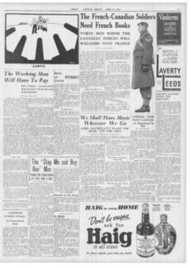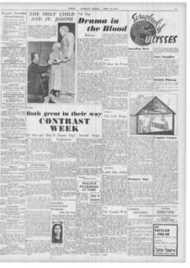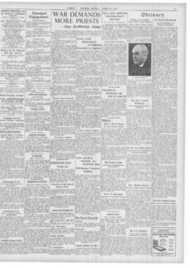Page 8, 19th April 1940
Page 8

Report an error
Noticed an error on this page?If you've noticed an error in this article please click here to report it.
Tags
Share
Related articles
Bible Studies —no. Jo
Bible Studies —no. 41 The Voice Of The Prophets: Amos
Bible Studies —no. 38 Introduction To The Prophets
Growing Day By Day
The Breathtaking Arrogance Of Spong
BIBLE STUDIES —No. 12 The Minor Prophets
(continued)
AFEW notes must suffice upon the Minor Prophets not yet mentioned in this series; from that we shall pass to the two books ol the Macahees and outline the history they cover, and thus bring to a conclusion our studies in the Old Testament..
It will be remembered that the prophets of the Old Testament fall roughly into three different historical periods, called respectively the Assyrian, the Chaldean and the Persian. These names are taken
By Charles G. Mortimer
from the predominant powers in the East whose rise and fall affected chiefly the fortunes of the Chosen People. Since this whole period of three
centuries from Amos to Malachi was one of grave political anxiety and included both the Exile and the Restoration, it was natural that prophecy should itself possess a definitely political colour, and that some of the prophets, notably Isaias, Jeremias and Daniel should be leading statesmen of their day. After the return from Exile a new set of problems arose, and once more the Jews were favoured with divinely inspired teachers and helpers; this whole body of prophecy therefore supported them in their earthly fortunes and pointed on to the true consummation of all their hopes, the Birth of the Saviour whose mission should be world-wide. After Malachi, C. 460 s.c., the voice of prophecy was stilled for about 400 years. No one arose to give the authentic message: Thus saith the Lord. It was not till the voice of the Baptist was heard, crying in the wilderness, " Prepare ye the Way for the Lord," that the nation realised that onch more events of paramount importance were at hand, Not that the mission of the Baptist was universally understood or even welcomed by all parties in the State; not that his message and personality could be adjusted at once to the Jewish scheme of things, as may be seen by their puzzled questioning of this great Old Testament Saint. But at least the Baptist ranged himself beside the famous seers of old, quoted their language, and re-assumed their evermemorable work. He had, too, his following; he baptised, he gave stern moral advice, he lived as the prophets of old—a life apart, a living parable; and he spoke of One to follow.
Now the Exile and its long sufferings had taught one lesson fully and finally. The Jews abandoned idolatry for ever. The post-exilic prophets have no longer to scourge them for that sin. Micheas, Sophoreas and Nahum may be placed in the Assyrian period; Habacuc in the Chaldean; Aggeus, Zacharias and Malachi in the Persian. The work of the earlier was supplementary to that of the great leaders, Isaias and Jeremias; the work of the latter was to comfort them during the tedious years of the Restoration; to rekindle the national hope; to encourage the rebuilding of the Temple and to interpret its Service. A light from the future strikes down on their wonderful words. Hence Malachi I, 10-11 has been accepted in Patristic and Catholic interpretation as foretelling the Sacrifice of the Mass.
" For from the rising of the sun even to the going down of the same, My name is great among the Gentiles; and in every place there is sacrifice, and there is offered to My name a clean oblation."
So the Jewish sacrifices, as St. Augustine says. will reach their term: the promised and universal sacrifice will be offered by the priesthood of Christ according to the order of Melchisedec.
Thus, too, Aggeus prophesies of the Second Temple: " The desired of all nations shall come and I will till this house with glory, sail)] the Lord of Hosts—and in this place I will give peace."
Next week: Maccahecs.
CHURCH BELLS FOR SCRAP.— According to reports from German occupied Poland it is feared that the decree issued by Goering ordering the registration of all church bells in Germany, which are to be put at the disposal of German war industries, will also be applied in German occupied Poland.
C.W.L. HONOURED.—The Pope has received in audience Mme. Steenberghe and the Countess of Hemptinne, president and secretary of the International League of Catholic Women.
blog comments powered by Disqus











